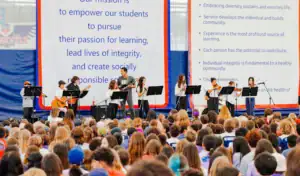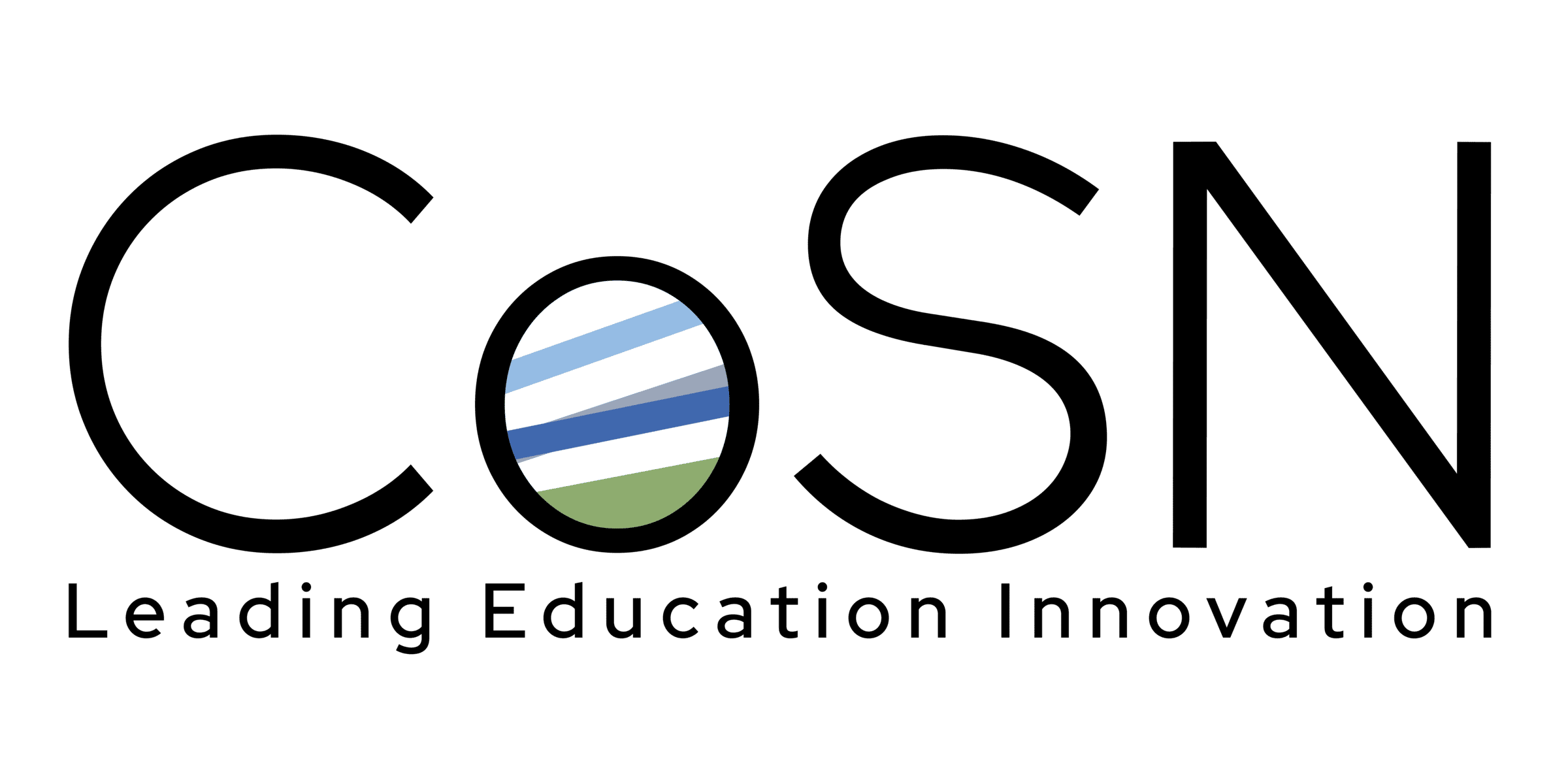As schools worldwide reimagine what it means for students to show what they know, one theme emerges clearly: learning is more than a test score or grade. In the classroom, educators are recognizing that authentic, student-driven demonstrations of learning better reflect creativity, problem-solving, and understanding than traditional, text-based assessments ever could.
From international schools to local districts, this shift is visible across learning communities, exploring how Universal Design for Learning (UDL), digital tools, and artificial intelligence can unlock new possibilities for both teaching and assessment.
CoSN’s Driving K-12 Innovation project defines Changing Attitudes Toward Demonstrating Learning like this:
There is a rising groundswell of discussion around how student learning is assessed, documented, and valued. Memorization, cultural biases, limited real-world applications – these are just some of the reasons why traditional testing may not be an effective means of assessment and may not accurately reflect a student’s true understanding of a subject.
This complex issue also involves discussion about relating student learning to higher education, vocational training, and career pathways. On one hand, there’s movement toward greater emphasis on learner agency, personalization, and lifelong learning; on the other hand, there are ongoing debates about the role of traditional educational institutions, the value of their experiences, and the challenges of aligning education with evolving career pathways. As a result, student trajectories through and beyond K-12 systems are shaped by both innovation and the pull of long-standing educational norms.
At Colegio Roosevelt, The American School of Lima, this evolution is taking shape in powerful ways. Ximena Nunez del Prado, Director of Technology and Learning Innovation and Driving K-12 Innovation Advisory Board member, recently shared in CoSN’s online forum why it’s important to position students as creators:
“At Colegio Roosevelt, The American School of Lima, we see this shift reinforced by two key drivers: the implementation of Universal Design for Learning (UDL) and the reality that artificial intelligence is here to stay. Together, these are prompting us to rethink traditional, text-based assessments and design alternative ways for students to demonstrate their learning. This is particularly powerful in supporting neurodivergent students, ensuring equity, and expanding opportunities for authentic expression and problem-solving. And why not create something unique to demonstrate their research, knowledge, and learning?
We also recognize our responsibility as educators to prepare students to understand what AI is and does, to leverage AI to enhance productivity, but more importantly, to do so with integrity and a strong ethical compass. True AI fluency requires more than technical skill; it must be intertwined with digital citizenship and critical reasoning so that graduates leave prepared to act as ethical and effective leaders in a complex world.

Colegio Roosevelt, The American School of Lima
At Roosevelt, student voice and agency already drive change and creation through multiple avenues where learners identify challenges and design solutions that benefit both our school systems and the broader community. In our STEM makerspaces, which serve students from age four through grade twelve, we see learners acting as ideators, innovators, and prototypers who persevere through multiple iterations until their designs succeed. These creations might emerge from a Grade 2 science unit, a middle school design engineering project, or a complex initiative from our TSA Honor Society. Of course, there is room to grow, and we are enhancing our efforts in UDL, AI guidelines, media and information literacy, and digital citizenship, aligning each with the ISTE Standards to guide our next steps, so that our students can thrive as creators who demonstrate their learning in new and creative ways.”
The movement at Colegio Roosevelt reflects a broader change happening across education: a redefinition of what counts as evidence of learning. Carla Puppo Perfumo, Learning Innovation Coach at Colegio Roosevelt and fellow Driving K-12 Ad Board member, further explained:
“Traditional assessments often fall short in capturing the depth, creativity, and complexity of student learning. As education shifts toward authenticity and purpose, there’s growing recognition that we must rethink how we measure what matters. Rote memorization, one-size-fits-all tests, and high-stakes formats often fail to reflect students’ unique strengths, lived experiences, and real-world problem-solving abilities.
Across learning communities, we’re seeing a move toward multimodal, student-driven demonstrations of learning—portfolios, performances, prototypes, podcasts, and projects that showcase not only what students know, but what they can do with that knowledge. These approaches foster learner agency, creativity, and metacognition, allowing students to reflect on their growth and make their learning visible. Technology is a powerful enabler here: tools like digital portfolios, multimedia creation platforms, and generative AI allow students to represent their thinking in ways that are personalized, accessible, and aligned to their passions.
Changing assessment practices also challenges educators to shift their mindsets. It requires moving beyond grading efficiency and embracing a culture of feedback, iteration, and celebration of diverse pathways. It means designing assessments with—not just for—students and ensuring that what we ask them to produce mirrors the kinds of challenges they will face in life. When learning is demonstrated through meaningful creation and purposeful application, assessment becomes a process of empowerment—not just evaluation.”
Together, these two perspectives underscore an exciting convergence. Technology — especially AI — paired with inclusive frameworks like UDL, is enabling students to express understanding in ways that are more personal, meaningful, and equitable.
As educators, this also challenges us to rethink our own practices: to move from grading efficiency to designing learning experiences that celebrate iteration, creativity, and ethical engagement with emerging tools.
When assessment becomes a process of creation rather than compliance, students don’t just demonstrate what they’ve learned — they become active participants in exploring what learning means.
Authors: Ximena Nunez del Prado and Carla Puppo Perfumo,
Colegio Roosevelt, The American School of Lima,
CoSN Driving K-12 Innovation Advisory Members
Published on November 4th, 2025
CoSN is vendor neutral and does not endorse products or services. Any mention of a specific solution is for contextual purposes.
BIOS
Ximena Núñez del Prado is the Director of Technology and Learning Innovation at Colegio Roosevelt, The American School of Lima. Over her three decades at FDR, she has played a pivotal role in shaping the school’s vision for educational technology, co-founding the Tech Team and pioneering technology integration into the curriculum in the region. Ximena leads initiatives in digital citizenship, AI ethics, cybersecurity, and professional learning, ensuring that technology enhances student-centered learning. She is also an active voice in global conversations on innovation, serving as an Advisory Board member for CoSN’s Driving K-12 Innovation Report.
Carla Puppo Perfumo is the Technology Integration and Learning Innovation Coach at Colegio Roosevelt, The American School of Lima. With over two decades of experience in educational technology and professional learning, she empowers educators to design inclusive, future-ready learning experiences that integrate STEAM, digital citizenship, and authentic student agency. Carla leads initiatives in coaching, systems-level innovation, and student-centered pedagogy, helping to translate the school’s vision into classroom practice. She is also a member of CoSN’s Driving K-12 Innovation Advisory Board, contributing to global conversations on the evolving role of educators in a rapidly changing world.

